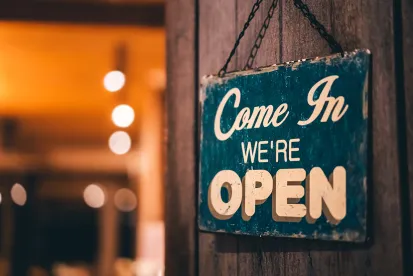On May 17, 2021, Governor Charlie Baker announced his plan to lift the State of Emergency in Massachusetts by June 15, 2021, and to rescind most of the Commonwealth’s COVID-19 restrictions on May 29, 2021. While this is welcome news to the many hotels, restaurants, and bars across the Commonwealth, as Massachusetts reopens, the lifting of the State of Emergency will trigger the expiration of several legal protections and processes that the Governor’s office put in place following the declaration of the State of Emergency in March 2020, including:
-
Mask mandates and capacity restrictions lifted on May 29.
-
Contact tracing and compliance penalties lifted on May 29.
-
Take-out and delivery alcohol sales no longer allowed as of June 15. Note: two bills pending in the MA legislature that would extend this program.
-
Local licenses for outdoor dining and alcohol sales set to expire 60 days after the State of Emergency lifted. Note: Governor Baker proposed legislation to allow municipalities to extend these licenses through November 29.
Mask Mandates and Enforcement Penalties
As of May 29, 2021, Massachusetts will no longer independently require face masks or coverings and instead will incorporate updated guidance from the Centers for Disease Control and Prevention (“CDC”), which advises that fully vaccinated individuals no longer need to wear face coverings or physically distance in any setting, indoor or out. Unvaccinated individuals are advised (but not required) to continue to wear face masks and physical distance.
Massachusetts businesses may continue to require customers to cover their faces, but many restaurant workers report ‘enforcement fatigue,’ and customers may be even more unlikely to comply if a restaurant’s policy is not backstopped by local/state/federal mandate.
Capacity Restrictions
All capacity restrictions will be eliminated as of May 29. Hotels and restaurants will be allowed to operate at 100% capacity for both indoor and outdoor events. Hotels and restaurants will no longer be required to enforce six feet of social distancing in common areas and may remove physical partitions previously installed in these areas.
Contact Tracing and Reporting Requirements
All Massachusetts sector-specific guidance will be lifted as of May 29. All industries will be encouraged to follow CDC guidance for cleaning and hygiene protocols. Contact-tracing and compliance penalties are also among the provisions that will be lifted as of May 29.
Take-Out Alcohol Sales
On July 20, 2020, Governor Baker signed 2020 Mass. Acts Chapter 118, allowing businesses already licensed for on-premises alcohol sales to sell mixed drinks in sealed containers for off-premises. This followed on 2020 Mass. Acts Chapter 53, permitting sales of beer and wine for take-out and delivery by businesses licensed for on-premises alcohol sales.
The provisions of both of these Acts will expire with the lifting of the State of Emergency scheduled for June 15. However, proposed bills are pending in the MA legislature that, if passed, would extend or make permanent the current rules permitting delivery and take-out alcohol sales.
Liquor License Permitting
During the State of Emergency, Massachusetts suspended the requirement for liquor license renewals to submit proof of liquor liability insurance coverage or worker’s compensation insurance coverage (as long as insurance coverage was evidenced prior to reopening). See COVID-19 Order No. 53, §3 (dated November 2, 2020). Any licenses renewed during the suspension of these insurance requirements will not be invalidated; however, all licensees will now have to prove insurance coverage before license renewal, whether they are operating or not.
Outdoor Dining
As Massachusetts made preparations for Phase II of its reopening plan in June 2020, the Governor fast-tracked outdoor dining permits as part of COVID-19 Order No. 35, §4 (dated June 1, 2020). Municipalities were allowed to approve areas for outdoor table service without complying with Massachusetts zoning rules or holding public hearings. Additionally, local liquor licensing authorities were allowed to amend existing liquor permits to add outdoor alcohol service without review or approval from the Massachusetts Alcoholic Beverages Control Commission (“ABCC”). These provisions were preserved and extended by COVID-19 Order No. 50, §1 (dated September 10, 2020). Per Order No. 50, these provisions will expire 60 days following the end of the State of Emergency, which will be August 14 if the State of Emergency is lifted on June 15, as planned.
Note that Governor Baker filed legislation on May 25, 2021, with the Massachusetts legislature that would allow chief executives or local licensing authorities to extend any outdoor permits that had been previously granted during the expedited process authorized by executive order. This bill could permit local authorities to extend these outdoor permits for any period of time through November 29, including canceling them before August 14, at their discretion.
Conclusion
In advance of the changes in the coming weeks and months, businesses across Massachusetts should be prepared to reexamine and revise their workplace policies to adapt. In particular, businesses that pivoted swiftly to delivery during the COVID-19 pandemic will have to plan for the possible elimination of take-out and delivery alcohol sales, and restaurants and hotels that have opened outdoor dining spaces must be prepared to either relicense such spaces or retreat to fully indoor dining. However, reluctance by some restaurant customers to eat indoors may squeeze restaurants who have seen outdoor dining as a lifeline throughout the pandemic.
The Baker administration has pledged to work with local towns and cities to ensure a smooth transition. As noted, there are efforts in the MA legislature to address some of the issues raised in this alert, though none has been passed as of the date of publication. Whether or not these or similar efforts pass, we anticipate that the ABCC and local zoning and licensing boards will be extraordinarily busy for the remainder of the year to address an influx of license applications.




 />i
/>i

